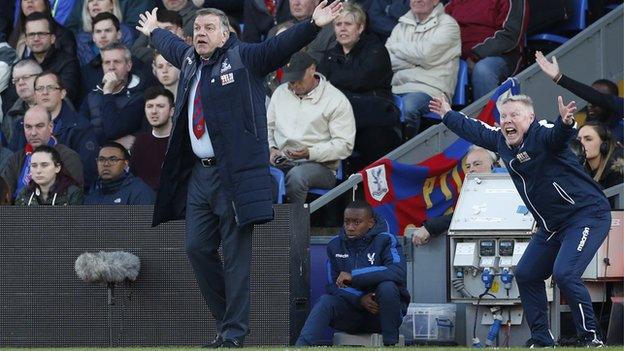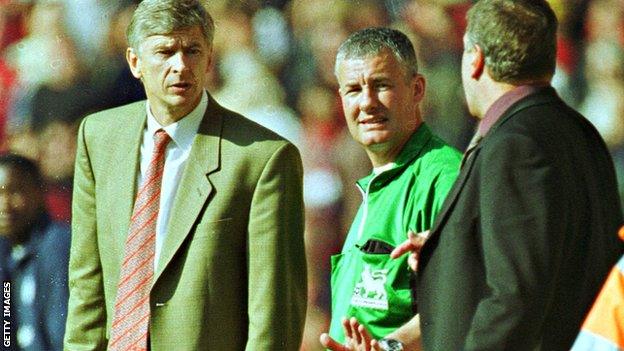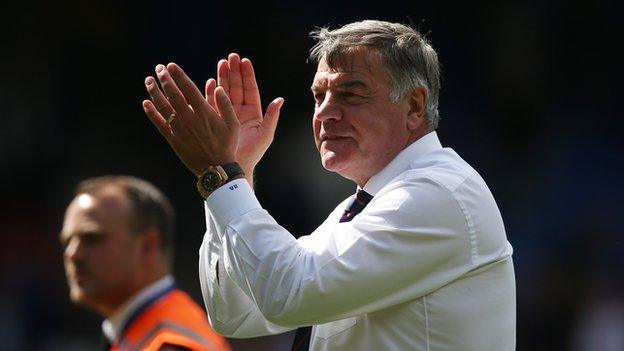Sam Allardyce: Was Big Sam ahead of his time or just a relegation firefighter?
- Published

"I have no ambitions to take another job," Allardyce said in a statement after resigning from Palace
Sam Allardyce claimed navigating Crystal Palace's route to Premier League survival had helped him recover and look to the future after his humiliating tenure as England manager, which ended after only 67 days and one game.
And so it proved - just not in the way anyone could have predicted - as he resigned suddenly on Tuesday night after only five months at Selhurst Park before penning what was effectively his retirement speech.
So is this really the end of the road for the 62-year-old who has been one of the domestic game's most enduring, controversial and divisive personalities? And how should he be viewed if this is farewell to the man known as "Big Sam"?
Will Sam Allardyce ever get the credit he deserved?
Sam Allardyce was often left alone to talk up his managerial credentials - condemned as a footballing dinosaur as he produced evidence to suggest he was actually among the game's modernisers.
Allardyce's most famous quote was arguably his claim: "I won't ever go to a top-four club because I'm not called Sam Allardici, just Sam Allardyce."
He quickly added: "That was tongue in cheek" - or was it?
It actually hinted at the under-appreciation Allardyce often felt was his lot in football, characterised as a back-to-basics long-ball exponent working in the shadows of what he regarded as more glamorous foreign names, whose body of work could not stand up to his.
And Allardyce had a point.
He took charge of six Premier League clubs in Bolton Wanderers, Newcastle United, Blackburn Rovers, West Ham United, Sunderland and finally Crystal Palace - more than anyone else in the competition.
Archive: Sam Allardyce's football philosophy
A study of the fates of Bolton, Newcastle, Blackburn and Sunderland confirms they have all ended up in different divisions after his departure, while he took West Ham back into the Premier League and stabilised them before performing a familiar rescue act on Palace this season.
Allardyce's highest Premier League position was sixth with Bolton, a remarkable feat, but this statistic must be viewed through the prism of his being consistently cast in the role of firefighter rather than foundation builder.
After one of his final matches in charge of Blackburn in December 2010, a 3-0 win against Wolves, I asked him would he ever get the credit he deserved?
The response was typical Allardyce: "We never get credit for things, but that's the way it is. We are just a small town club enjoying ourselves by winning football matches. The fortress of Ewood Park is back and the walls are getting higher."
And how they crumbled when he was sacked by new owners Venky's days later.
Allardyce was also happy to work some of the game's stellar names and, despite his public perception, they were happy to work with him.

Andros Townsend gave his (short) response to Allardyce's resignation on Twitter
At Bolton he successfully incorporated France World Cup-winner Youri Djorkaeff, Nigerian maverick Jay-Jay Okocha and Real Madrid legend Fernando Hierro into his team. Ivan Campo also flourished.
And as he guided Palace to safety, he utilised the flair of Yohan Cabaye, Wilfried Zaha and Andros Townsend while using his tried and trusted methods to rejuvenate Christian Benteke.
Allardyce can also point to the fact he has always been a man in demand, even when his stock was at its lowest after his departure as England manager.
He managed for 488 games in the Premier League, the fifth highest in the competition and a tally second only to Harry Redknapp among English managers.
And he has called time on his managerial career with his proud record of never having a Premier League relegation on his CV still intact.
An achievement all the more commendable considering he took over at Sunderland in October 2015 when they were second bottom and winless after eight league games, and at Palace on Christmas Eve 2016 when they were 17th, just one point off the relegation places.
Palace were, at that stage, the worst performing of all 92 Premier League and Football League sides in 2016 before York City - who were bottom of the National League at the time - with 26 points from 36 games, an average of 0.72 points per game.
When history looks back at Allardyce's career, it may well eventually be viewed more generously and with greater credit.
England exit will taint reputation forever
Sam Allardyce openly coveted the England job for a decade - while others might have played down their ambitions or ability to do the job, he openly revelled in the possibility and was confident of success.
He even went as far as to claim his chances of succeeding Sven-Goran Eriksson back in 2006 were damaged by the FA's lack of PowerPoint facilities.
Allardyce wrote in "Big Sam: My Autobiography": "I wanted to do a real knock-your-socks-off PowerPoint which looked at every single detail. There was nothing missing. Nobody but nobody was going to beat it."
He was the told there were no PowerPoint facilities at the interview venue and he was reduced to handing out hard copies of his presentation.
Sam Allardyce: 67 days in 67 seconds
So, despite his rehabilitation at Crystal Palace, the manner of his dismissal departure after only 67 days and a single World Cup qualifying win in Slovakia, will be a stain on his reputation forever.
In the wider context, he will always be the man who was forced to give up the job that was his life's ambition after one match.
Increasingly, questions have been raised about whether he said or did anything wrong when he was caught in a Daily Telegraph "sting".
But his lack of judgement and naivety in ending up in a situation where he admitted "entrapment has won", left the Football Association feeling it could not continue with a manager tainted in this fashion and by what it called "inappropriate" behaviour.
And this will be a cause of regret to Allardyce forever.
To watch him in action as the national manager was to see someone at home in the spotlight in which so many had been dragged down, including his predecessor Roy Hodgson when he resigned after England's last-16 exit to Iceland at Euro 2016.
Comfortable and relaxed with the media, clearly taking such pleasure in using the phrase he had hoped to utter for a decade, "I am England manager", the man who started his first interview on the FA website with the words "I can't stop smiling" found the laughter had stopped.
Why was Big Sam an acquired taste?
Sam Allardyce was, and remains, a highly popular figure within the game - approachable, humorous and with a rich source of stories and one-liners.
He was, however, a taste that was never quite acquired by many who questioned his methods and his blunt refusal to be burdened down by any sense of modesty about his achievements.
Allardyce's advocates, and there are many, suggest he simply has great self-belief and confidence and can back up his words with results - his detractors painted him as a bluff figure of limited tactical ambition, who dressed up constant mid-table and lower-table survival as major success.
It was perhaps that "Allardici" quote and his claim that he would win a title every year if he was in charge of Real Madrid or Inter Milan, that made him derided in some quarters - as well as his obvious relish in getting under the skin of some of management's biggest games.
When Jose Mourinho accused Allardyce's West Ham of playing "football from the 19th century" to get a goalless draw at Chelsea in January 2014, he insisted he did not care - albeit using a more colourful turn of phrase.
Allardyce added: "He can't take it, can he?
"He can't take it because we've out-tactic-ed him, out-witted him. He just can't cope."

Arsene Wenger had this to say about Allardyce's Bolton side after a 1-1 draw in 2001: "Every goal-kick and throw-in, you have to talk to the ref to get it taken. Every substitution, the players are walking off the pitch. It's a problem."
Arsenal manager Arsene Wenger used to become infamously frustrated by Allardyce at Bolton.
He won only four of 12 games against him in that time and was badly wounded by a 2-2 draw that virtually cost the Gunners the title in 2002-03.
Allardyce wrote in his book: "I enjoyed beating Arsenal more than anyone when I was in charge at Bolton. We'd really got to them and Arsene Wenger hated us."
He also provoked a sarcastic response from current Newcastle United manager Rafael Benitez when he claimed Liverpool's 2005 Champions League win, when they came from 3-0 down at half-time to beat AC Milan on penalties in Istanbul, was "nowt to do with him" in his autobiography, instead saying the victory was down to captain Steven Gerrard.
It was part of a long-running feud between the pair and Benitez, then at Real Madrid, asked his Spanish inquisitors: "Do you know who Sam Allardyce is? Do you know how many trophies he has won? Well, that's my answer."
It was this refusal to bow down before so-called bigger clubs, their managers and their supporters - even his own, when he cupped his ear to angry West Ham fans during a win against Hull City in January 2015 - that has made him a manager and personality who divides opinion, but never a man afraid to fight his corner.
Allardyce did it his way, using his methods, and will say his record shows he was successful.
And if they did not like it he might use the same colourful quip he once delivered in Mourinho's direction.
The unlikely moderniser
Rarely has the public's perception of a manager's methods differed so vastly from his own - Allardyce, with justification, regarded himself as well-versed in the most modern methods, while those who disapproved believed his tactics were simply a long-ball, physical throwback to a previous age.
It is worth listening to a player who worked under him, former Liverpool defender Stephen Warnock, who was with Allardyce at Blackburn Rovers.
He said: "Before I played for him, I was unsure what it would be like because of the perceptions there are of him. The reality could not have been further away from what some people think.
"Sam is a thorough, analytical manager as tuned into the demands of the modern game as any I have worked for."
He added: "Look at the job he did with Bolton, and the calibre of technically gifted players he had. You're not telling me they would have hung around if they thought they weren't being encouraged to express themselves."
Allardyce is renowned for having a specific game plan for every occasion and passionate about the importance of recovery periods, nutrition and supplements.
He was one of the first to make use of ProZone data and used meticulous performance analysis techniques at the cutting edge of sports science.
He was also happy to use sports psychologists to improve results.
It is at odds with the image many have.
In reality, he was always happy to embrace modern techniques.
How will Allardyce be remembered?
If this is to be the end of Sam Allardyce's career, the verdict delivered on it will be as divisive and varied as ever.
Allardyce's supporters will talk of a man ahead of his time, denied a top job by an unflattering public image.
Those who never acquired his taste will question a man they believe found his true level as one of football's most efficient and successful firefighters.
The sadness for Allardyce is that one short period now threatens to always overshadow a managerial career that has had many outstanding moments and left the fans of many clubs grateful - even nostalgic - for the time he spent with them.
Allardyce, unfairly or not, will be remembered by many as the man who spent a career building up to his life's ambition - only to see the dream crumble in 67 days as England manager.
- Published21 May 2017

- Published19 May 2017
